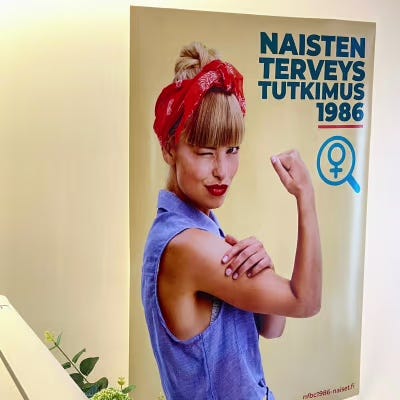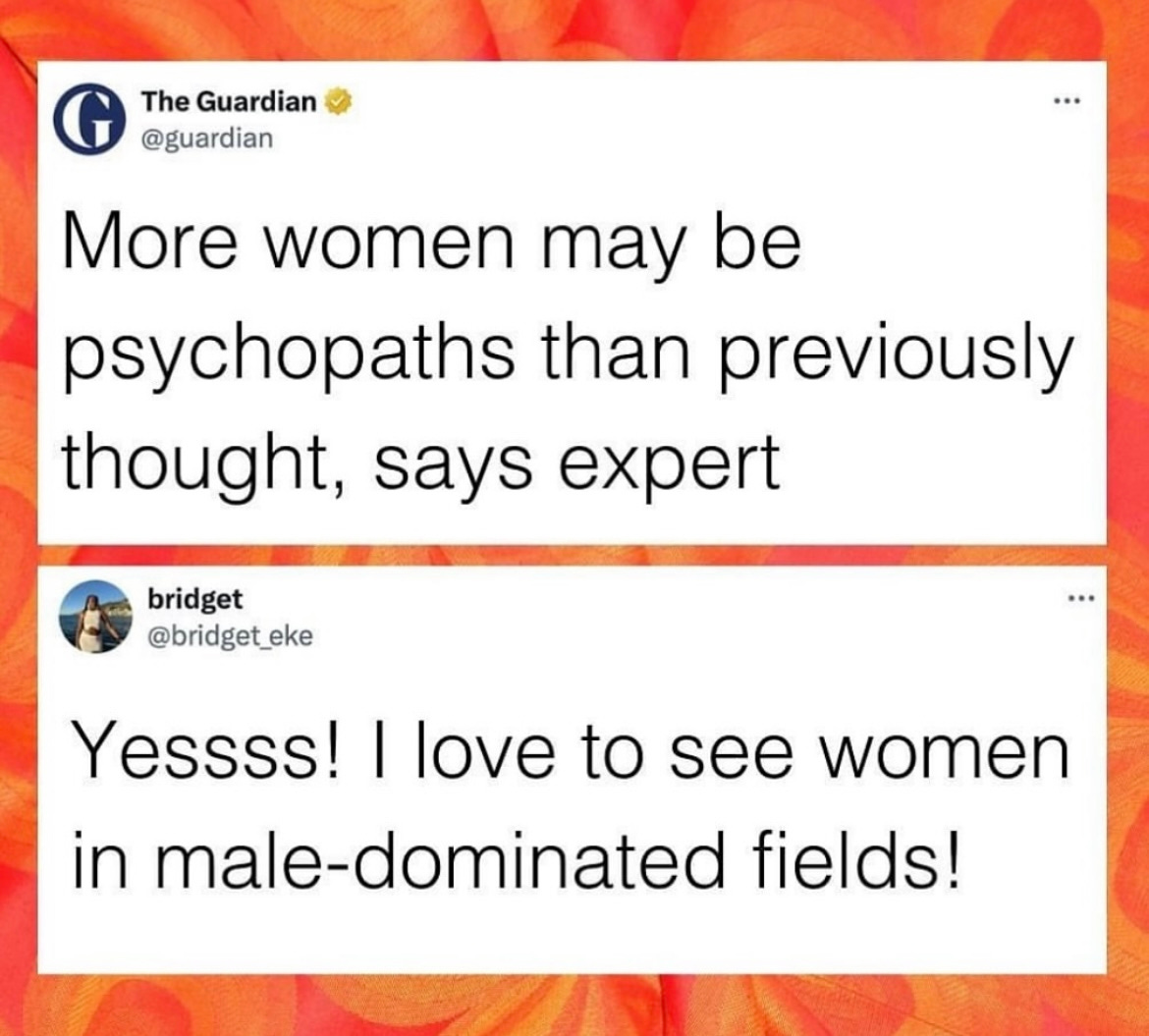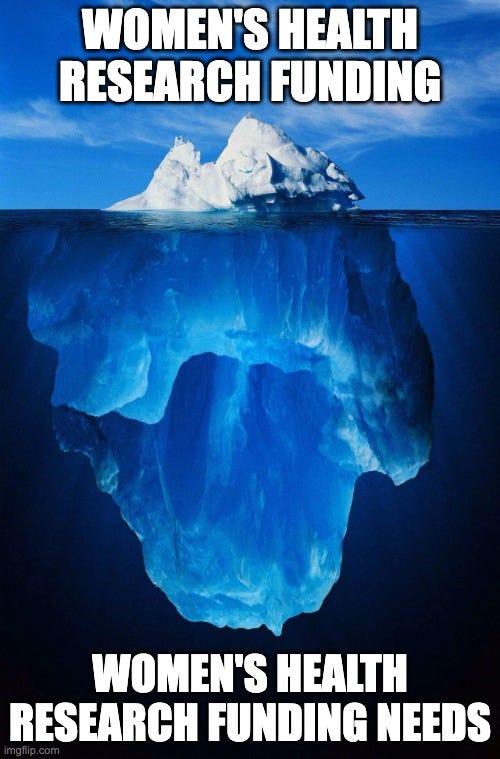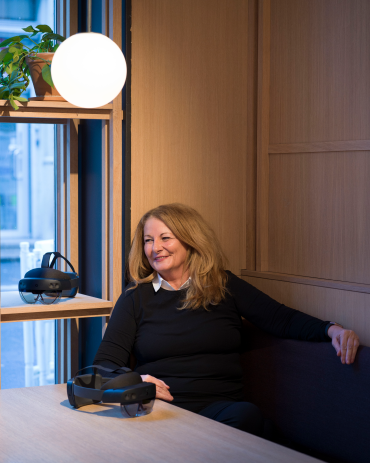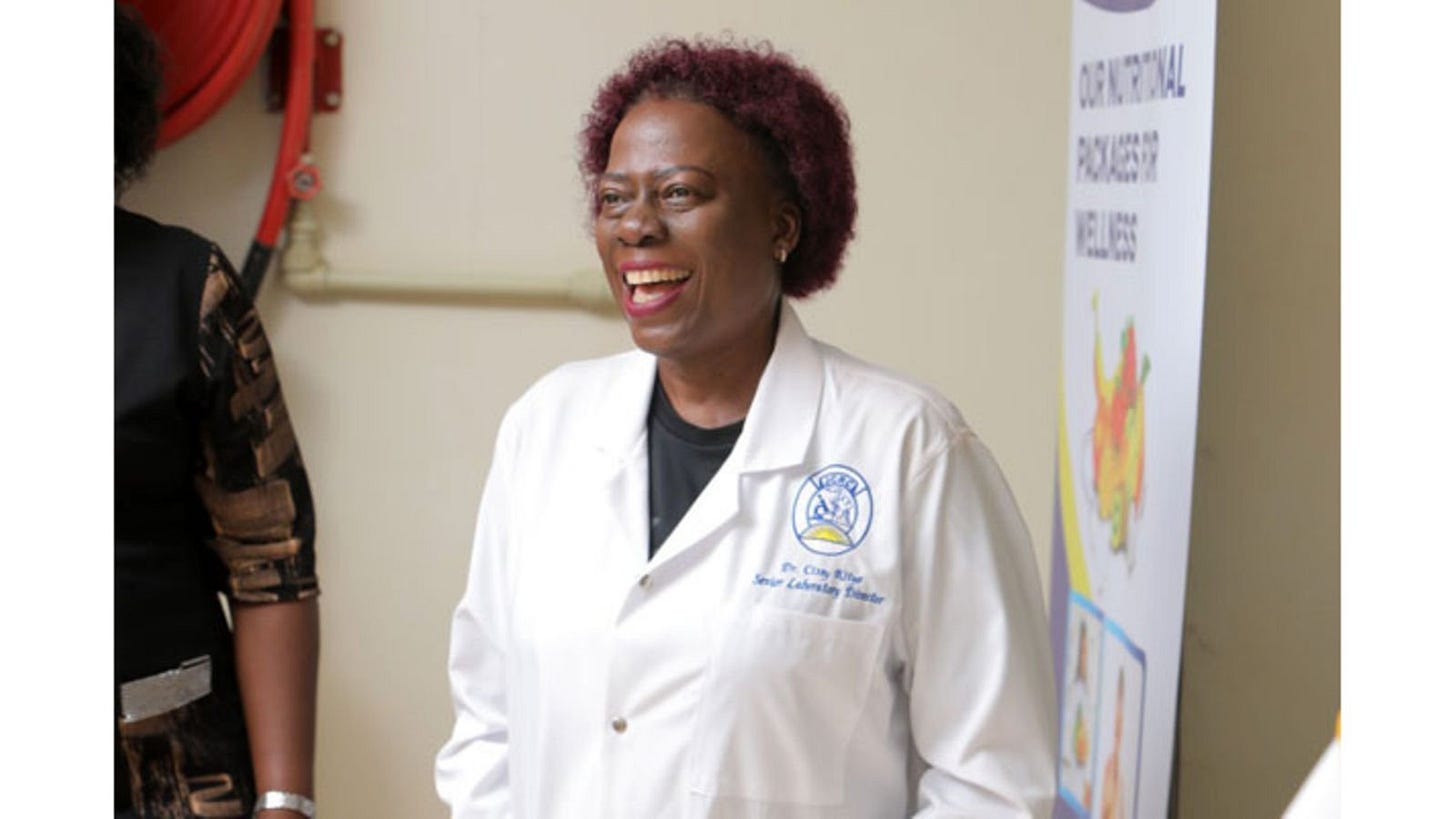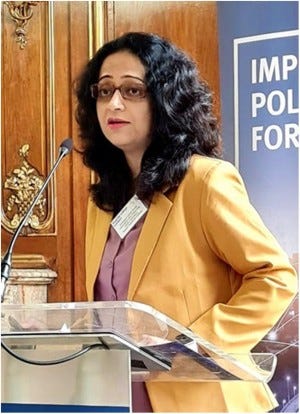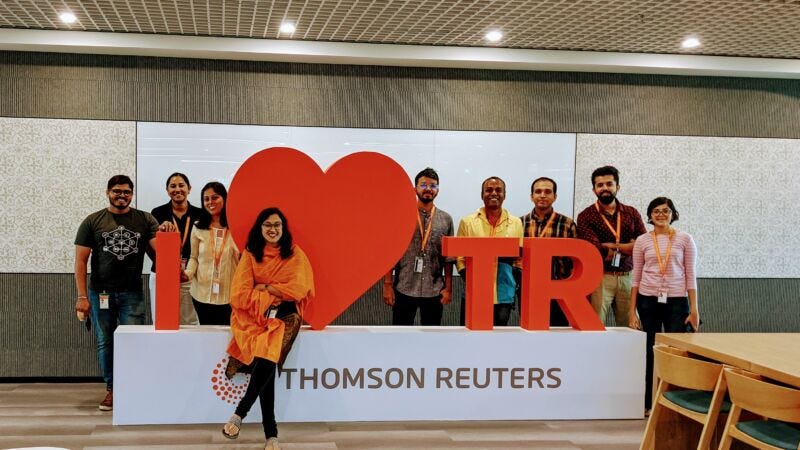Issue 12: Women of Science Mar '24
News, research, reviews, recommendations on all things women in science
Welcome back to Women of Science, featuring all the best happenings in the world re: women of science 🧬
🔬 What to expect?
All subscribers receive the free edition covering highlights in media, awards and discovery as well as things to read, see and watch re: women in science. Drops alternate Tuesdays (we’ve changed the schedule!). Tell your friends:
Thank you for joining. Enjoy the read.
A quick run-down of this issue:
Abstract & Intro: News and updates on all things women of and in science
Materials, Methods, Discussion: An interview with HoloCare CEO Alison Sundset
Conclusions & Further Reading: Reads, interviews, podcasts, events & links this week Abstract & Intro
Headlines, news, notes & media snippets re: women of science
📌 Healthcare: Scientists found a major clue why 4 of 5 autoimmune patients are women
Stanford scientists have reportedly found a major clue as to why 4 of 5 autoimmune patients are women, published in the journal Cell: A molecule called Xist — found only in biological women — appears to be a major culprit 👀
📌 Healthcare: Talking therapies could help women through menopause, study finds
CBT and MBI have recently been shown to help with quality of life and to lesser extent anxiety and depression in female subjects going through menopause 🩸
📌 Healthcare: Three-decade study shows increased disease among women in Finland
Disease and obesity have increased among women in recent decades, according to research that followed female participants from before birth into adulthood in Finland 🇫🇮
📌 Healthcare: French female health startup Sorella raises €5M
Paris-based Sorella, a female health startup, announced that it has closed a €5M round just one year after launching its first multidisciplinary health clinic. The investment was led by Paris and New York-based impact investment firm blisce/ and joined by Vorwerk Ventures 💰
📌 Psychology: More women might be psychopaths than we think, new study suggests
A recent study has challenged the belief that psychopathy is predominantly male, suggesting that female psychopaths may use deceit and seduction more than males for social and financial gain, posing significant implications for society and organisational leadership 🧠
📌 General STEM: Funding in Germany aims to boost share of women in science
In the first round of a funding programme designed to support female professors at German universities, 92 institutions have won out: The Joint Science Conference (GWK), a body that coordinates science policy between Germany’s federal and state governments, said that a review panel picked the winners from a pool of 108 grant proposals 💴
📌 Engineering: TalentSprint's new program WISH for Women Engineering students, supported by Google
Supported by Google, the program offers scholarships and internships for women engineers (and is open to applicants now) 🔧
📌 Tech: Taskforce Urges Investment in Women-Led Ventures to Fuel UK's Tech Evolution
On the one hand, a glaring gender gap in the UK's high-growth entrepreneurship ecosystem is hindering progress and stifling the full potential of women…
📌 Tech: Gender gap in tech jobs narrows across advanced economies
…BUUUUT an increasing demand for IT jobs and flexible arrangements is helping more women to join workforces across the US, EU and UK, according to the FT 💃
📌 Tech: Bro 2.0: Australian tech's problem with investing in women includes how much they're paid
And in more gender pay gap news, here’s what Australia are revealing, with studies suggest hiring people like the one in the middle may lead to reductions in the gender pay gap 👨💰 👩
More than 1200 women in technology from across Pakistan competed, learned, networked and showcased their tech talents at the most recently held 8th edition of Women Tech Quest (WTQ).
& in other brief news:
Materials, Methods, Discussion
This week featuring an interview with Alison Sundset…
Alison Sundset is CEO at HoloCare, a Norwegian healthtech startup using hologram tech to transform surgery. She has over 20 years of experience leading companies across the life sciences, pharma and healthcare industries and has held senior roles in Philips, Pfizer, and the Bradford NHS Foundation Trust.
Hi Alison – congratulations on the new launch! Can you tell us more about what HoloCare is and how it works?
Certainly! We are a medtech startup based in Norway that creates interactive 3D holograms of individual patient organs to help surgeons precisely plan and prepare for surgery. Ultimately, our technology aims to enhance surgical efficiency, improve patient outcomes, and positively impact clinician well-being.
Our software works alongside virtual reality headsets, such as Microsoft’s HoloLens, to transform 2D medical images (such as CT or MRI) into personalised, interactive 3D holograms.
These holograms – which clinicians can interact with in real 3D space – provide surgical teams with a detailed spatial understanding of a patient’s unique anatomy, allowing them to plan the safest and most efficient surgery for each patient.
Who have you partnered with so far, and what has this accomplished?
We’ve been lucky to have worked with incredible clinical partners throughout our journey: In Norway, we have an extremely fruitful partnership with Oslo University Hospital, who continue to champion us. Their surgeons have not only supported us in the design and development of our software – ensuring that it meets the needs of clinicians and hospitals – but have tested it in a pre-clinical setting. Our clinical research study on the potential impact of mixed reality technology for pre-surgical planning will be published later this year.
Off the back of our recent CE and UKCA marks, we've now launched in five hospitals across the UK and Europe, including Oslo University Hospital and Leeds Teaching Hospital.
Here, our technology is being used to support surgical planning for liver surgery, particularly liver resections, which are commonly carried out to treat liver and bowel cancer.
Looking forward, we are expanding our reach further still – and are planning to launch in ten further European hospitals in 2024. We’ve also just kicked off a very exciting 4-year collaborative project, through which we’ll be developing augmented reality tools for use across the perioperative pathway. More on that soon…!
How do you see HoloCare fitting in among the raft of healthcare innovations within the UK, and in particular where you’re based, Norway?
Our position in the healthcare landscape is unique, as we fill an important gap in the surgical pathway. By assisting teams to collaborate and reach consensus on surgical planning faster, our technology helps hospitals improve surgical efficiency and safety, save money on lengthy planning meetings, and reduce waiting lists for operations.
Much like our partnership with Oslo University Hospital, we’ve also joined forces with Leeds Teaching Hospitals NHS Trust to support clinicians with surgical planning for liver resections. These complex procedures – where part of the liver tissue is removed – require detailed planning to navigate each patient's unique liver anatomy.
Our software creates personalised 3D holograms of each patient’s liver, enabling surgeons to visualise and strategise complex liver surgeries with enhanced precision, and potentially reduce complications.
Across our clinical sites in the UK, Norway and Europe more widely, our software is helping clinicians work with better surgical workflows, benefiting patients and clinicians with reduced operative and administrative pressures, and improved outcomes.
What are you most looking forward to in 2024 for the company?
We’ve already achieved our first significant milestone: receiving our CE and UKCA marks, and commercially launching into our first hospitals! But we also have some other big plans in store for 2024…
As I mentioned earlier (we can't say too much yet), we are looking forward to kicking off a multi-year collaboration with European partners. That’s starting imminently, so look out for that announcement soon! We’re also hoping to hit our next regulatory milestone in 2024 – we’re setting our sights on America…!
2024 will also see the first clinical impact results from our commercial launch partners, as they begin trialing, and training with, our technology. I’m really excited to see that initial data from clinicians, which will further contribute to the validation of our platform.
Overall, 2024 is shaping up to be an incredibly exciting year for HoloCare as we continue our mission to advance medical imaging and redefine surgical workflows.
🧬 Find out more here: www.holocare.com
Conclusions & Further Reading
More links & signposts for you to enjoy this week…
Books & review articles:
🦖 From a pocketful of rocks to scientific director of palaeontological research: PhD candidate Dirley Cortés says that it takes grit and guts to navigate the challenges of being a Latin American woman in palaeontology.
Women in Tech: “It’s still essential to celebrate and encourage more women to join the industry”: Sirin Aktas, CIO and Executive Committee Member at Edenred Turkey talks to CIO Middle East shining a light on the critical role of women in technology.
🔧 The Right Balance: Women in Engineering - Features: Speaking with Orla Douds, Anousha Khan, Martyna Cepaite, and Jessica Pidgeon, IChemE’s National Early Careers Committee (NECC) asks female engineers to share their experiences of gender balance.
👩💻 What is a portfolio career and do I want one? Zoe Hewitt at Sifted EU tackles the question of taking on a portfolio career whilst balancing risk tolerance and personal goals.
🤰🏽 The parenting penalties faced by scientist mothers: Starting a family at a key career stage comes at a cost to birthing parents — and many end up leaving the profession as a result.
Interviews:
👩🏿🔬 I mentor, train women to love science - Dr Kityo: Dr Cissy Kityo Mutuluuza is an experienced specialist medical doctor, vaccinologist and public health expert with more than 31 years’ experience in conducting and coordinating Aids research and care for HIV patients. Here, she advises women to take up the many scholarship opportunities targeting women in the science field, writes Beatrice Nakibuuka.
🌌 Women in physics: an interview with Urbasi Sinha: Urbasi Sinha is a Professor of Light and Matter Physics at the Raman Research Institute, India. Her research is in the field of quantum technologies, where she uses experimental methods to investigate quantum information processing, precision tests of quantum mechanics, photonic quantum computing as well as quantum communications including quantum key distribution (QKD) in free space, fibre and integrated photonics.
Shirsha, a Director of Engineering for TR Labs based in India, heads up TR Labs - the dedicated applied research division of Thomson Reuters focused on the research, development, and application of AI and emerging trends in technologies.
Podcasts:
🎙️ SheTalksTech: Season 6 Ep 8 on Angel Investing
In this episode of She Talks Tech, we hear from Yenny Cheung, who is the senior director of product at rapid API and is also an angel investor: Here, Yenny explores gender stereotypes, growth mindset and imposter syndrome, she also dispels the myth around what a “techie” looks like, and why she is intent on helping others as an angel investor.
🎙️ LadyBug Podcast: A Day In The Life Of Four Software Engineers: One from the archives, the LadyBug Podcast ep shines a light on what a typical day in the life is like for a software engineer.
Opportunities:
ESGO 2024 Congress: Europe's leading Gynaecological Oncology gathering celebrates its 25th anniversary this week, showcasing the most innovative advances in clinical practice for gynaecological cancers treatment and care.
📍 Barcelona, Spain: 7-10th March 2024
Empowering Women In Health Tech: Although women represent half of the planet’s population, many health aspects relating specifically to women are still out of focus of general scientific research and underrepresented in clinical studies and medical recommendations, resulting in misdiagnosis and bias in research, diagnostics, and therapies for female patients.
In celebration of International Womens Day, WHMTC are talking with Reena Sidhu, Commercial Enterprise Lead, Health Innovation West Midlands to find out what they are doing to bridge the Gender Gap in Health Tech.
📍 Online: 5th March 2024
That’s all for this issue!
Thank you for reading: The WoS mission is to support, share and promote the innovative and groundbreaking work that has been and continues to be done by women across all scientific disciplines, and to empower and inspire the next generation of female leaders in the field.
If you liked it, here’s another reminder to share us with your friends, network, neighbours, coffee baristas ☕ etc.:
Over the coming months, the WoS community will also be adding to its repertoire of channels for sharing content, so watch this space!






